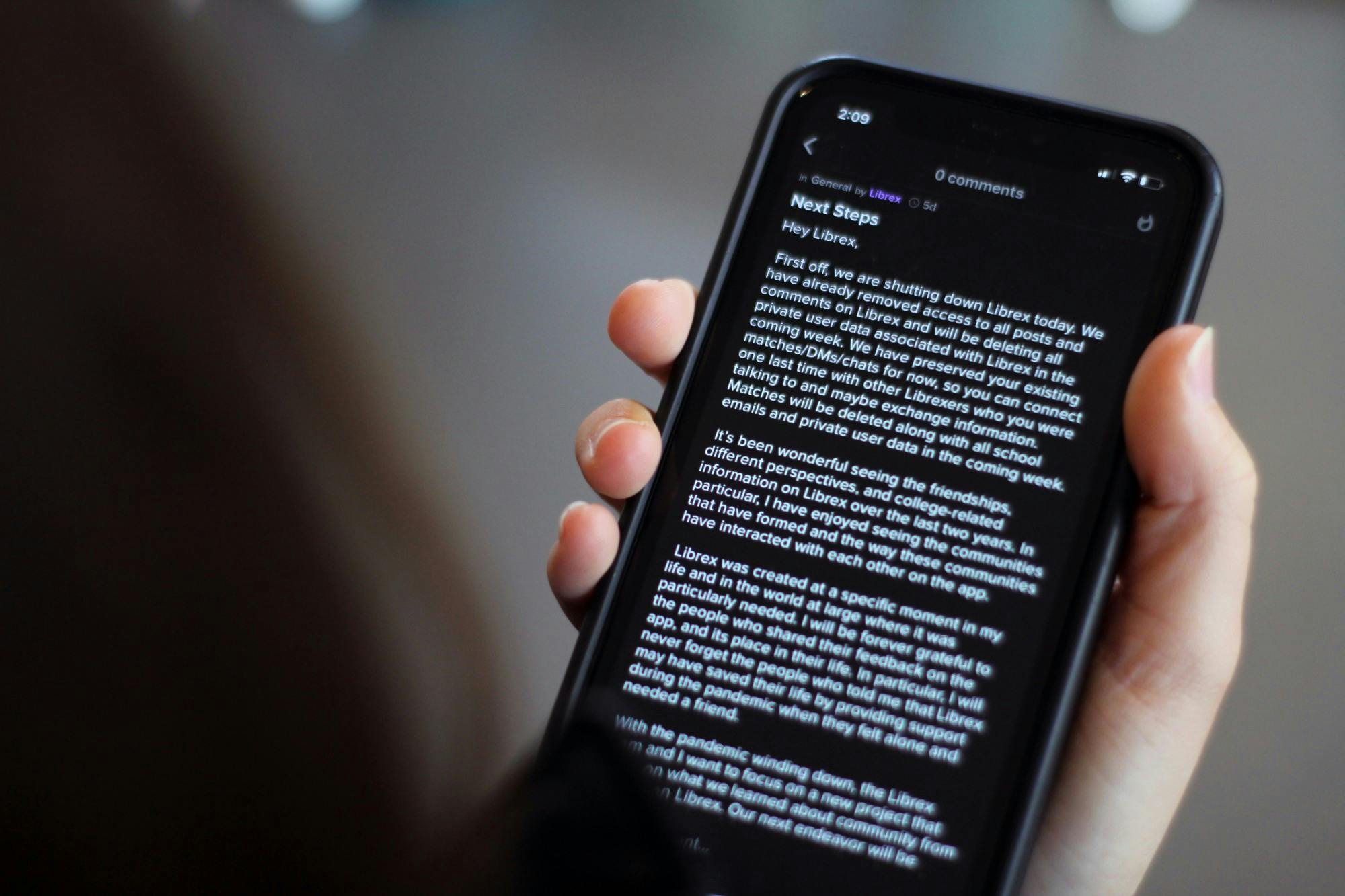Librex founder Ryan Schiller announced in a Feb. 17 post that the anonymous discussion platform would be shutting down effective immediately, citing a lack of time to manage the anonymous discussion app and commitments to other projects. The end of Librex — an app that, according to Schiller had approximately 2,000 users at Dartmouth — has prompted mixed reactions from the student body.
In an interview with The Dartmouth, Schiller said that the speed of the move was intentional.
“I get that it was tough for people,” Schiller said. “Over half of Dartmouth’s campus signed in every day to the app. I wanted to make it as easy as possible for people … but also not to create a space for speculation or hysteria.”
Schiller wrote in the Librex post that, in keeping with its mission of anonymity, matches along with all school emails and private user data will be deleted in the coming weeks. He further noted in the interview that his team will not sell any private user data or keep any personal user data, adding that anonymity was “something [his team has] upheld since day one.”
Launched in March 2020 just as the pandemic began sweeping across the world, Librex provided a space for both conversations and controversies on campus, including public, anonymous attacks on candidates during the 2020 Student Assembly elections.
In the wake of the app’s sudden closure, many Dartmouth students were left surprised and have been reflecting on the app’s impact. While some students said Librex provided entertaining content, others said they were disturbed by the controversial comments on the app.
Nicholas Higginbotham ’25 said that while he does not use Librex frequently, he will miss the app for some of the lighthearted content he had seen on the platform.
“I wasn’t a big user of Librex, but, from what I saw, it had a mixed impact on the community,” Higginbotham said. “I definitely saw a lot of negative things on there, but I know a lot of people enjoyed using it, and some of it was pretty funny. I think I’ll miss it.”
Alex Bramsen ’22 said that after some of the posts on Librex took a more racist and xenophobic turn in 2020, she had to get off the app for a while. She added that the only reason she redownloaded the app afterwards is because she wants to check out the trends that her friends were commenting on.
One student, who requested anonymity in order to speak candidly, said that they used the app “more than [they are] willing to admit,” for “entertainment, procrastinating and genuine questions.”
Another student claimed that he had been a prolific figure on the site, spawning several trends, including one which dominated the final weeks of the app: the “Hmmm…” trend.
“I’m shocked and devastated — I probably spent about four to five hours on Librex every day,” he said. “It was a meditative experience.”
While Schiller acknowledged that the app was not perfect, he said he believes the platform ultimately did more good than harm. In particular, he noted instances in which Librex facilitated discussion about administration policy, gave a group of undergraduate women a space to come together through matches to form a finance club and hosted a live Q&A for a speaker.
Harshit Yadav ’22, president of the Dartmouth Mixed Reality Club — which launched the anonymous campus-wide chat application Airfeed after Librex shut down — said he was disappointed by what he sees as a lack of progress made on Librex during its lifespan. He noted that overall, he thinks the app, which only had a feed and match feature, did not live up to its possibilities.
“I think Librex was extremely short-sighted and focused, and we’re not trying to do that,” Yadav said.
Advertisements for Flok, another new anonymous chat app, have also appeared around campus and in group chats.
Schiller said he is now planning a new project that is not college-focused and targets a much larger community, adding that he and his team are currently in “stealth mode.”
He added that he believes Librex fulfilled its original purpose, which was “to create a forum on campus where people could discuss important issues that were happening in their lives and in the community at large, and to create a sense of community within the campus where people could connect to each other through these issues.” Overall, he said he feels that the app has been a success and achieved its goal of connecting people.
“In particular, I will never forget the people who told me that Librex may have saved their life by providing support during the pandemic when they felt alone and needed a friend,” he wrote in his message.




